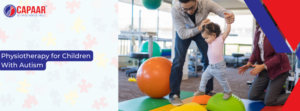What is Autism Spectrum Disorder (ASD)?
Autism is a neurological and developmental disability that manifests itself in the early developmental stages of children’s lives. Autism also affects children’s social skills, normal brain functioning, and communication development. You can get an idea of how serious the condition of autism is by the fact that it is a life-long condition and there is no accurate treatment available for it. Arguably, the seriousness of the condition can be reduced by giving special education and training.
Many children with autism spectrum disorder (ASD) experience difficulties with their motor skills and abilities, in addition to behavioural, sensory and social-emotional difficulties.
Role of Physiotherapy for Children with Autism
Before we move on to physiotherapy for children with autism spectrum disorder, it is important to know how to diagnose it. Early diagnosis is therefore important for children with autism spectrum disorders, to enable effective intervention, treatment and management. This helps families access the appropriate services and supports for their children as quickly as possible.
If you have even the slightest doubt about your child’s behaviour, you can take the help of a paediatrician or a child psychologist professional to confirm the diagnosis of autism.
- Generally, children with autism lack motor skills, and physiotherapy for autism focuses on developing the gross motor skills of children. For example – sitting, walking, jumping, crawling, rolling etc.
- Some autistic children lack this skill due to low muscle tone. Gross motor and coordination problems can affect children’s social and physical development as well as their basic day-to-day functioning.

Physiotherapists use the following techniques and interventions to help a person with autism get the most out of them, which are given below-
- Therapeutic exercise
- Hydrotherapy
- Simple play
- Manual therapy
- Hippotherapy – therapeutic horse riding
- Recreational therapy
Physiotherapists decide the treatment method based on two parameters for motor skills and communication development of children. First, age and second developmental level.
The main focus of physiotherapy in young children is on their basic movement skills such as walking, sitting, playing and standing. Depending on the age of the child, treatment focuses on complex movement skills such as climbing stairs, throwing, jumping, and catching. Sports contribute significantly to the skill development of children and enhance their social engagement.
In addition, the physiotherapist works with parents and teachers of children with autism to create an environment for the child that helps build gross motor and coordination skills, and muscle strength.
If you have a child with autism or you suspect that your child may have autism, you can contact our physiotherapist for better services and treatment.

